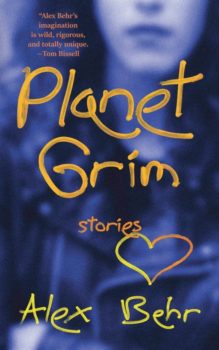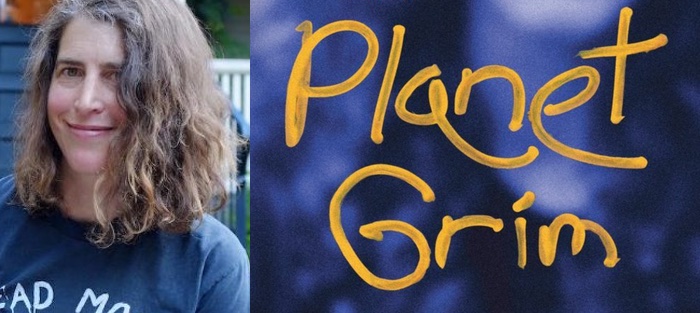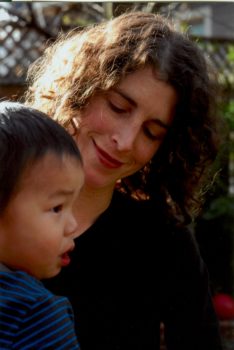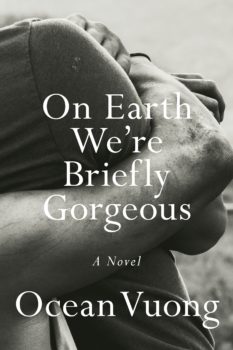I knew I wanted to interview Alex Behr four pages into her debut story collection, Planet Grim (7.13 Books), which opens with a story about a pre-teen girl getting her period in front of the whole school. Bobby, “the stinky kid,” ties his filthy hoodie around her waist in an attempt to hide the stain. Scared that people will think they’re dating now, the narrator rebuffs him. Undeterred, Bobby continues to pursue her. Behr writes:
I know this now: Bobby was the first of many guys who found me pathetic, who saw me as a project.
I didn’t think of him for years, because he moved away—his new stepdad was in the Air Force and got stationed in Mountain Home, Idaho. He sent me a letter, though. He sent me a bunch, which got progressively stranger, even though his spelling improved. He told me he wanted to take out my eyes, which are green, and put them in a jar by his bed. He meant it as a compliment.
The image is disturbing, the narrator’s casual delivery even more so (what has happened in her life that allows her to be so unconcerned?). The wrongness of Bobby’s letter feels so exactly right: it captures the way life can be disappointing and surreal and hilarious at the same time. I really wanted to ask Behr how the hell she did that so deftly.
Behr’s work is full of this freaky, casual sorcery. The stories are by turns funny, grimy, and compelling. Her characters betray themselves and each other at every turn, yet it’s impossible not to care about them because they feel so honestly, messily human. In “The Passenger,” one of my favorite stories in the collection, a punk named Joe picks up a girl who claims to be named Jolene. They go back to her house and sit on her bed, petting a kitten, “still high on acid, still afraid to pee or undress or walk.” The moment is both lonely and tender in a way that’s hard to define, and when Joe says he wants to “know that feeling, to put it into music” I understood exactly what he meant. Planet Grim is an anthology of moments you could write a song about.
Alex Behr’s work has appeared in Tin House, Nailed, and Bitch, among other publications. She has participated in the comedy show Mortified, and her work has been adapted for stage performance. She has played in experimental indie bands, including the Double U. Planet Grim is her first book.
I spoke with Alex via email. Our conversation has been edited for length and clarity.
Interview:
Emily Nagin: You played in indie bands in the ’90s, and many of your stories revolve around the West Coast music scene. How is the process of writing fiction similar to the process of making music? How is it different?
I miss the “prompts” that come with playing music in a band. I was in a band with my ex-husband (the Double U) from about 1993 to 2011. Over time I trusted my bass lines less and less and stopped playing guitar, so eventually Matt, my husband/bandmate for years, had all the parts I would play in his brain. He fully orchestrated everything. I will never be in a band again with someone who both knows my limitations as a musician and pushes me to get better—and understands the rhythmic and melodic strangeness that I crave.
The tension arose because we couldn’t keep people in the band: no one wanted to tour much, eventually we were new parents—plus we never gained much of a following. A lot of erosion in the marriage happened because of my actions (resentment about practicing in a cold basement when other things economically were stressing me out). Some of the happiest moments in my life have been in bands when things are going well because of the full-body release of a physical activity with other people who “get” me. It involves most of your brain and heart. It can be (though not necessarily in our band) sexual, and it has allowed me, a shy person, to collaborate with extremely talented and strange men and women. I was bad at sports. This is my sport. I miss it so much.
Writing, obviously, is solitary and I never have that joy in a reading as I do playing music. I play classical piano to relax. In that practice (classical piano), as with last years of my band, I transmit the will of a male artist. With writing: it is feminine, bloody, and strange.
 You’ve also done comedy. I feel like so much of comedy is storytelling. Is that your experience? How has your work as a comedian influenced your process as a writer?
You’ve also done comedy. I feel like so much of comedy is storytelling. Is that your experience? How has your work as a comedian influenced your process as a writer?
When I first read your question I was like: nah, I’m not a comedian. But I have performed in Mortified, which is a comedy show. If it smells like funny . . . The script comes directly from my teen diaries. I wrote every word, but the producer and I edited out the OCD stuff and sharpened each entry to have pathos and an arc. I know what will get laughs. “My boil burst. Blood and pus came out a little.”
I can trust my writing . . . if it makes me laugh it will probably make others laugh. I can read publicly without fear (though I have nightmares before about pages dissolving or words melting on the page) and I can read without laughing at my own writing (that will kill the mood).
I look back at some of the stuff I wrote as a teen and it was just so heartbreakingly sincere that, from an adult perspective, it rounds the corner into hilarious. That actually leads perfectly into my next question: Your collection really got me thinking about empathy. You aren’t easy on your characters–they go through some rough shit and they’re often self destructive–but I never felt like I was being encouraged to look down on them. I really admired that balance. What are your thoughts on empathy in writing? Where do you draw the line between being hard on your characters and allowing them to be sympathetic?
I feel like I err on the side of being hard on my characters for the sake of humor or to have a conflict that gets pushed to an extreme. Some influences in short stories: John Cheever, Raymond Carver, Nan Goldin, Miranda July, Mary Gaitskill (earlier stuff), and music I like: The Fall, the Birthday Party, Thinking Fellers Union Local 282, Fuck, World of Pooh, Pere Ubu, Blonde Redhead, Lucinda Williams, Radiohead, the Melvins. They have influenced me in offering to audiences the joy of chaos and chance and beauty in odd moments, like a crushed butterfly.
I like all my major characters! I think that’s why I haven’t written a novel, because I’m not sure I want to fix a character’s problems when I can barely fix my own. But I need to get beyond the idea that a novel has to be figured out beforehand. I make quilts and can’t conceive of the entire thing when I’m starting out cutting out squares (to be simplistic). Because of the music I like or the culture I’m drawn to, I don’t allow myself to be sympathetic too often in writing, except when I’m writing about my son. It might be a protective device, in that I don’t want to go from sympathetic to sentimental (when, in fact, I am sentimental in real life . . . any person hearing me talk to my cat would barf) . . . I’m sure my fiction would find more readers if I could make more sympathetic characters (I think you mean: are they relatable, are they redeemable, are they people you would want to hang out with?).
One guy in a novel class was so full of loathing toward a character in a story I handed out that I almost didn’t include it in the collection. He said he felt suffocated and couldn’t wait to step away (and much more). He found pleasure in his cruelty. Some of my alienation toward people comes out in how I write, though. But take a character like the narrator of “Eddie’s Father,” who lusts after the birth mother of his child, I do find him likable. He is earnest!
The stories in Planet Grim all feel very of a piece thematically, but there are a few that also seem to share a common narrator. I’m thinking of “The Passenger” and “Some Weird Sin,” which I loved and which both center around a punk named Joe. Is it the same Joe? Do you see any of your stories as linked by recurring characters?
Yeah, Joe is the person the guy in the novel class loathed (he was writing a novel about jolly homeless people being eaten by zombies under the Burnside Bridge). I have started a novel about Joe that was set aside during a long breakup and divorce. I had written about Joe’s father, too (another musician). I would like to go back to it. I had slathered on a crime element that would take me too long to write (due to research), so I set it aside for the past couple of years.
For what it’s worth, I would totally read a novel about Joe. Even in short glimpses, he feels very real and very compelling. Aside from character, another thing that stood out to me about your work was the level of detail—it’s so gorgeous and memorable. There are certain images I still can’t get out of my head—the girl in “The Passenger” petting a kitten while tripping; that moment in “White Pants” when the narrator puts a dead bird in a utility box—how do you know when you’ve gotten a detail just right? What makes you say, Yes, that’s the one to include?
Thanks! I will write that damn novel! I did pet a kitten while tripping! (Wait, did I say that?) I was at a party wearing my Granny’s black dress and the singer from Three Day Stubble poked me in the chest and said something about death. Wait. This is fiction. I went back to my apartment in Oakland and made sure my roommate never knew I was high.
All the other details I wrote by hand in a notebook. I think handwriting makes my brain connect to ideas more freely than if I type on the computer. I don’t restrict the train of thought. That might be from two habits:
- Keeping a diary (example from seventh grade: “Biology: a preacher talked to us about the origins of life. Bible sounds true. Adam—mankind? . . . talked onto tape about my problems. Tape got messed up.”).
- Writing down things people say (especially if I’m close to them and they have either made me laugh or made me mad—in the joke that was marriage counseling my pen nearly jumped off the page—it was electric in hurt and rage).
I am sensitive and shy and feel like an outsider, so any strange details stick in my mind and often make their way into my stories. I read the stories aloud many times before they were sent to the publisher (or published separately), so the weird details eventually become part of the whole.
Your work also plays around with form. “White Pants” spans years of the narrator’s life, whereas stories like “Observations of Punk Behavior” and “Angel Dust” are flash. What’s your favorite thing about playing around with form and structure?
It’s less about playing around with form and structure and more about my time constraints and emotional load. The bulk of the stories are from my master’s thesis (or before, in other workshops) and have been through the workshop grind. I used to think I had to take every person’s comment to heart and address them all. Now I know most probably read the stories shortly before class and put in whatever emotional energy, boredom, anxiety from elsewhere in their lives into the brief reading. Not most, but some. Or it comes down to their imagination doesn’t understand mine.
I took out some stories that were too similar to others (my themes are fear, mistrust, loneliness—hello!), and added some raw writing from my notebooks. My publisher didn’t have a problem with them, so . . . I decided to make a collage of pieces that show my collapsing mental state (and sometimes humor) during a long breakup and divorce. Some are from a couple of flash fiction classes, too. I’ve also taught flash fiction to teens, so I’m interested in that form. It’s like a dropping the needle down into a locked groove or stopping at the static between radio stations.
Workshop is such a weird, intense experience! It can be so helpful and supportive, but you’re right that all of us have, at some point, brought our outside crap into the room and (often unconsciously) projected it onto other people’s writing. I’ve had it happen to me, but I also know I’ve done it to others. Your book actually finishes with a section called “Feedback” in which you list some pretty insulting workshop comments you’ve received over the years. It was so funny and infuriating and cathartic to read, kind of like the “Guy From Your MFA” Twitter account. What gave you the idea to include that?
I read “Feedback” at my Powells reading, which went over well because most people would not read criticism of themselves out loud. When I teach teens writing I show them a diagram of the brain that shows what lights up based on descriptions of action, sensory details, etc. (to show them the impact of their stories on others), but we haven’t talked about the paralyzing effects of mean feedback. It can halt stories and silence writers. Being in a band that is unpopular—you still have each other. Writing: it’s just you. No one else really gives a shit if you write more or not because there are so many writers of equal talent/skills. You should see how much jam I have made lately. People like raspberry jam more than written stories.
I collected mean comments for years, then of course someone else published similar content in McSweeney’s, before I could get my shit together to do it. Leland (my publisher and editor) was in my writing group years ago, and since the book started as a two-person enterprise—and remained that way almost to the end—that section was a joke for him (he is a comedian, too). Would he put negative comments in the second book he published? Why, of course!
I was bullied and have a fear of bullies, so it is masochistic to be in an environment like workshop where you are paying to give bullies a hard surface, fluorescent lighting, maybe a couple of grapes, and as much time as they want to excoriate your work.
I am sure I have been too harsh on people’s writing, too.
You’ve talked a lot about your process as a writer, from drafting to workshop to compiling the final manuscript. What’s the most challenging thing about writing for you? What’s your favorite thing?
Challenging: when I was doing something for LitReactor I read some “don’ts” in fiction, and I’ve done them all: worrying too much about actions during dialogue, describing people by hair color only . . . etc.
I know I don’t feel comfortable writing from the first-person or close third-person POV of a character of color. I have one short flash piece that is from POV of a Chinese-American adoptee, but that is extrapolating from being the mother of a son who was born in China. I don’t feel I have the authority to assume that voice. I can’t do it with authenticity, and I feel if it were first-person POV it would verge into appropriation.
Challenging: developing a satisfying conflict—or even dealing with conflicts head on, since I tend to be an avoidant person or else get in fights from which there is no return.
Dialogue: a challenge.
Crowd scenes: a challenge.
Favorite thing: freewriting and seeing what happens. Making myself laugh.
Okay, I didn’t come up with this last question (it was originally conceived by one of my coworkers). When the kids at the high school where I work are creating characters, we ask them a series of idea-generating questions. One of them is this: What is your character’s favorite song? What’s a song he/she/they loves but is really embarrassed by?
Since Joe is one of your recurring characters and might one day own a novel, let’s apply that to him. What’s his favorite song? What’s a song he loves but would never admit he loves?
His favorite song would be “Some Weird Sin,” because there’s a story named after him. I love Iggy Pop’s solo albums from the Berlin period.
The next one I thought about an absurdly long time, and even made myself faintly nauseous. I’m torn between songs my brother mocks me for, rightly so . . . Supertramp, “Take the Long Way Home,” or Gerry Rafferty, “Baker Street.” I will go with the latter, since that would go against Joe’s statement in “The Passenger” (story title taken from another Iggy song):
You wanted to believe you’d lived through something. That the music wasn’t empty. That the muscles and blood and skin were put together for some reason beyond a pissing match between a bartender and a singer with a chipped tooth, now breathing heavy, now punched in the stomach by a skinhead.
I’m making this part up now: He heard it on the radio when his parents said they weren’t divorcing after all. I have written about this: His dad is a famous musician/alcoholic. So obviously, Joe relates to the line,
Winding your way down on Baker Street
light in your head and dead on your feet.
Well, another crazy day.
You’ll drink the night away
and forget everything.
This city makes you feel so cold.
It is actually the perfect song for him!







